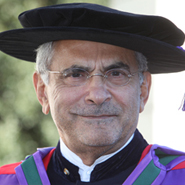Jose Ramos Horta
 TEXT OF THE INTRODUCTORY ADDRESS DELIVERED BY DR NIAMH HARDIMAN, UCD School of Politics and International Relations, University College Dublin on 8 March 2010, on the occasion of the conferring of the Degree of Doctor of Laws, honoris causa on Dr José Ramos-Horta
TEXT OF THE INTRODUCTORY ADDRESS DELIVERED BY DR NIAMH HARDIMAN, UCD School of Politics and International Relations, University College Dublin on 8 March 2010, on the occasion of the conferring of the Degree of Doctor of Laws, honoris causa on Dr José Ramos-Horta
A Uachtaráin, a mhuintir na hOllscoile, agus a dhaoine uaisle uilig,
I am privileged to welcome Dr. José Ramos-Horta to UCD where he will be conferred today with the degree of Doctor of Laws, honoris causa. Dr. Ramos-Horta has spent his entire adult life engaged in political and diplomatic activity to secure freedom for the people of East Timor, which became Timor-Leste when it finally secured its independence in 2002. Since that date he has served as Foreign Minister and as Prime Minister, culminating in his current role as President. But his years in high office are only the most recent episode in a remarkable life. ‘Unhappy the land that has need of heroes’, Brecht’s Galileo says. Dr. Ramos-Horta can certainly be counted among the heroes of a land that has had more than its share of unhappiness.
Heroes come in many forms. During the long years of military repression and occupation, he became the voice of his people in the international arena. He travelled constantly to the centres of power, trying to right the injustices that had been inflicted upon his people. For Emerson, the characteristic of genuine heroism is its ‘persistency’, and this is certainly true of Dr. Ramos-Horta. For an unconscionably long time, the world preferred to look the other way: East Timor seemed to be a forgotten tragedy, overlooked by international law. But the cause of justice is not to be measured by the size of the population. John Locke wrote that ‘the end of law is not to abolish or restrain, but to preserve and enlarge freedom.’ Eventually, the United Nations was moved to accept that the legal and moral case for the freedom of East Timor could no longer be neglected. Dr. Ramos-Horta’s persistent and skilled diplomacy finally yielded its prize.
Dr. Ramos-Horta, in Yeats’s words, had set his chisel to the hardest stone. In doing so, he endured long years of sacrifice and struggle beyond the comprehension of those of us fortunate enough to live in more settled worlds. Four of his brothers and sisters were killed in the conflict. Though personal loss on such a scale might have led many to bitterness or despair, Dr. Ramos-Horta’s commitment to hope and reconciliation remained undimmed. For as Tocqueville has observed, ‘freedom alone substitutes for the love of comfort more powerful and lofty passions. It alone supplies ambition with greater objectives than the acquisition of riches’.
Dr. Ramos-Horta’s political vision sees freedom as grounded in justice and human rights. The citation for the Nobel Prize which he was awarded in 1996 held up for commendation his unwavering commitment to the search for a peaceful solution to the conflict with Indonesia. These values continue to inform his life to this day; indeed, his efforts toward reconciling differences within his own country almost cost him his life in 2008. And yet as Burke said, ‘freedom and not servitude is the cure of anarchy’, and the political life of Timor-Leste has developed in a more orderly and peaceful fashion than many would have dared to predict a mere ten years ago.
Many Irish people came to feel a special bond with East Timor because of the campaign initiated by Tom Hyland in 1992. Starting with one individual’s resolve to make a difference, the campaign grew in momentum and helped push the issue to prominence in Europe, the USA and Australia. So we in Ireland claimed some small share in the rejoicing when independence eventually came about.
Dr. Ramos-Horta combines deep immersion in scholarship and learning with his life of active political engagement. He has held positions in leading academic institutions, and has been honoured with awards from numerous universities. He has devoted considerable time and resources to creating new opportunities for learning, especially in support of human rights and the defence of the interests of minority peoples.
Dr. Ramos-Horta has played a vital role in healing divisions within his own country, building bridges with its biggest neighbour, and keeping faith with the principles of freedom, justice, peace and reconciliation that have informed his whole life’s work.
Tocqueville said that freedom alone creates the light that makes it possible to see and to judge the vices and virtues of mankind. Through the leadership of Dr. José Ramos-Horta, his country shines an exemplary light not only for others in the region but for the whole world. The light that freedom has created in Timor-Leste has made clear the measure of the man we honour today and the magnitude of his achievement.
Praehonorabilis Praeses, totaque Universitas,
Praesento vobis hunc meum filium, quem scio tam moribus quam doctrina habilem et idoneum esse qui admittatur, honoris causa, ad gradum Doctoratus in utroque Jure, am Civili quam Canonico; idque tibi fide mea testor ac spondeo, totique Academiae.